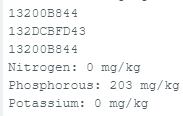hi, i have a problem where only the phosphor value is read, this is my arduino code:
#define RE 8
#define DE 7
//const byte code[]= {0x01, 0x03, 0x00, 0x1e, 0x00, 0x03, 0x65, 0xCD};
const byte nitro[] = { 0x01, 0x03, 0x00, 0x1e, 0x00, 0x01, 0xe4, 0x0c };
const byte phos[] = { 0x01, 0x03, 0x00, 0x1f, 0x00, 0x01, 0xb5, 0xcc };
const byte pota[] = { 0x01, 0x03, 0x00, 0x20, 0x00, 0x01, 0x85, 0xc0 };
byte values[11];
void setup() {
Serial.begin(9600);
Serial1.begin(4800);
pinMode(RE, OUTPUT);
pinMode(DE, OUTPUT);
digitalWrite(DE, LOW); // Set DE and RE pins to receive mode
digitalWrite(RE, LOW);
}
void loop() {
byte val1, val2, val3;
val1 = nitrogen();
delay(250);
val2 = phosphorous();
delay(250);
val3 = potassium();
delay(250);
Serial.print("Nitrogen: ");
Serial.print(val1);
Serial.println(" mg/kg");
Serial.print("Phosphorous: ");
Serial.print(val2);
Serial.println(" mg/kg");
Serial.print("Potassium: ");
Serial.print(val3);
Serial.println(" mg/kg");
}
byte nitrogen() {
digitalWrite(DE, HIGH);
digitalWrite(RE, HIGH);
delay(10);
if (Serial1.write(nitro, sizeof(nitro)) == 8) {
Serial1.flush();
digitalWrite(DE, LOW);
digitalWrite(RE, LOW);
for (byte i = 0; i < 7; i++) {
//Serial.print(Serial1.read(),HEX);
values[i] = Serial1.read();
Serial.print(values[i], HEX);
}
Serial.println();
}
return values[4];
}
byte phosphorous() {
digitalWrite(DE, HIGH);
digitalWrite(RE, HIGH);
delay(10);
if (Serial1.write(phos, sizeof(phos)) == 8) {
Serial1.flush();
digitalWrite(DE, LOW);
digitalWrite(RE, LOW);
for (byte i = 0; i < 7; i++) {
//Serial.print(Serial1.read(),HEX);
values[i] = Serial1.read();
Serial.print(values[i], HEX);
}
Serial.println();
}
return values[4];
}
byte potassium() {
digitalWrite(DE, HIGH);
digitalWrite(RE, HIGH);
delay(10);
if (Serial1.write(pota, sizeof(pota)) == 8) {
Serial1.flush();
digitalWrite(DE, LOW);
digitalWrite(RE, LOW);
for (byte i = 0; i < 7; i++) {
//Serial.print(Serial1.read(),HEX);
values[i] = Serial1.read();
Serial.print(values[i], HEX);
}
Serial.println();
}
return values[4];
}
this is the output:

this is the schematic :

